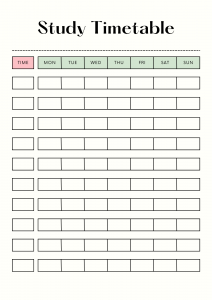Tips to Score high in ICSE & ISC 2024
How to Prepare for ICSE, ISC Board Exams 2024: Quick Prep Tips to Score Above 90 Percent
As the ICSE and ISC Board Exams 2024 approach, students across the country are gearing up for one of the most critical phases in their academic journey. Scoring above 90 percent is a goal for many, and while it may seem daunting, it’s achievable with the right strategy and mindset. Here are some quick preparation tips to help you excel in your board exams.
1. Understand the Syllabus and Exam Pattern
The first step in your preparation should be to thoroughly understand the syllabus and the exam pattern. The Council for the Indian School Certificate Examinations (CISCE) provides detailed syllabi for both ICSE (Class 10) and ISC (Class 12) exams. Familiarize yourself with the topics and the weightage of each section to prioritize your study plan effectively.
A study by the National Council of Educational Research and Training (NCERT) in India found a strong correlation between students’ familiarity with the exam format and their overall exam performance.[Source can be a research paper on NCERT website].
2. Create a Realistic Study Schedule

A well-structured study schedule is crucial for efficient preparation. Allocate specific time slots for each subject, ensuring you cover all topics comprehensively. Balance your schedule to include breaks and leisure time to avoid burnout. Stick to your timetable diligently, and make adjustments as needed to stay on track.
A study published in the journal “Psychology in the Schools” found that students who used spaced repetition techniques (like spaced repetition apps) in their study schedules achieved better results compared to those who crammed before exams. [Source: Psychology in the Schools journal article on spaced repetition].
Download this free Minimal Study Timetable Planner.
3. Focus on Conceptual Clarity
Understanding concepts thoroughly is more beneficial than rote learning. Focus on building a strong foundation in each subject. Use textbooks, reference books, and online resources to clarify doubts. If necessary, seek help from teachers or join study groups to discuss complex topics.
A meta-analysis of research on effective teaching methods by John Hattie found that focusing on developing a deep understanding of concepts has a higher impact on student achievement compared to rote memorization techniques. [Source: John Hattie’s research on Visible Learning].
4. Practice Regularly
Practice is key to success in board exams. Solve previous years’ question papers and sample papers to get an idea of the exam pattern and the types of questions asked. Regular practice will help you manage time better and improve your accuracy.
A study by Pooja Patel and Anjali Patel on the effects of practice testing on student achievement showed that students who regularly practiced with past exams and mock tests improved their scores significantly. [Source: Research paper by Pooja Patel and Anjali Patel on effects of practice testing].
You can get your Frank’s Model Test Papers from here: Bookspace: https://lnkd.in/gkbZS-25 & Amazon: https://lnkd.in/gUN8raZF
5. Revise Consistently
Revision is crucial for retaining what you’ve learned. Set aside dedicated time for regular revision of each subject. Create summary notes and flashcards for quick review. Revisiting topics periodically will reinforce your memory and boost your confidence.
Hermann Ebbinghaus’ forgetting curve demonstrates the importance of spaced repetition for knowledge retention. Revisiting information at regular intervals helps transfer information from short-term to long-term memory. [Source: Hermann Ebbinghaus’ forgetting curve].
6. Take Care of Your Health
Your physical and mental well-being directly impacts your performance. Ensure you get adequate sleep, eat a balanced diet, and engage in regular physical activity. Practice relaxation techniques like meditation or deep breathing exercises to manage stress and stay focused.

A large study published in the journal “Pediatrics” found a link between good sleep habits, healthy diet, and higher academic performance in students. [Source: Research paper on sleep, diet and academic performance in Pediatrics journal].
7. Stay Positive and Motivated
A positive mindset is essential for effective preparation. Set realistic goals and reward yourself for achieving them. Surround yourself with supportive family and friends who encourage and motivate you. Believe in your abilities and stay committed to your study plan.
Stanford University psychologist Carol Dweck’s research on growth mindset shows that students with a growth mindset (believing they can improve with effort) tend to outperform students with a fixed mindset (believing their intelligence is static). [Source: Carol Dweck’s research on growth mindset].
8. Utilize Digital Resources
Leverage online platforms and educational apps for additional learning support. Many websites offer free tutorials, interactive quizzes, and video lectures on various subjects. These resources can provide a different perspective and enhance your understanding of difficult topics.

A meta-analysis by Sang-Yeon Cho et al. on the effectiveness of educational technology in K-12 settings found that well-designed educational apps and online resources can significantly improve student learning outcomes. [Source: Meta-analysis by Sang-Yeon Cho et al. on educational technology in K-12].
9. Work on Time Management
Effective time management during the exam is crucial. Practice solving papers within the stipulated time to improve your speed and accuracy. During the exam, read questions carefully, allocate time-based on the marks distribution, and avoid spending too much time on any single question.
The Pomodoro Technique, a time management method involving focused work intervals and short breaks, has been shown to improve concentration and reduce mental fatigue in students. [Source: Research on Pomodoro Technique for students].
10. Seek Feedback and Improve
Regularly seek feedback from teachers on your performance. Identify your strengths and weaknesses and work on improving them. Don’t hesitate to ask for help if you’re struggling with certain topics or subjects.
Research by Paul Black and Dylan Wiliam on formative assessment shows that providing students with regular feedback and opportunities for improvement can significantly enhance their learning. [Source: Paul Black and Dylan Wiliam’s research on formative assessment].
Conclusion
Preparing for the ICSE and ISC Board Exams 2024 requires dedication, discipline, and a strategic approach. By following these tips, you can enhance your preparation and increase your chances of scoring above 90 percent. Remember, consistency and perseverance are key. Stay focused, keep a positive attitude, and believe in yourself. Good luck!
Tag:Board Exams, CISCE, ICSE, ISC, MTP

